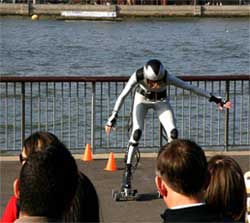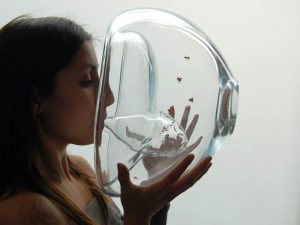Right, another ars electronica. I arrived yesterday and the rain was pouring non stop which was a bit of a bummer not only because i’m wearing sandals and can’t find nice boots in Linz but also because many of the art works are scattered throughout the city. No Brucknerhaus thus. The theme of this year’s festival being Goodbye Privacy, the organisers figured out that the installations should be exhibited in public space. So downtown you’ll find a damp, very damp beach with soaked beach seats and many art installations and projects lined up on a narrow street. Let’s start the report on ars electronica nice and easy with one of these works spilled onto the streets: In Your Hands, a performance involving remote control roller skates created by Dash Macdonald.


For the performance, Macdonald places his fate into the hands of audience members by letting installation visitors remote-control the roller skates strapped to his feet.
Where he skates is determined by the person holding the remote. But the spectacle is meant only to divert attention from what’s actually going on—namely, a subversive social experiment that critically questions how far people are prepared to go in pursuit of their own entertainment.
 The work is inspired by the Milgram (1961) and the Stanford Prison experiments (1971). The Stanford prison experiment was a psychological study of human responses to captivity and its behavioral effects on both authorities and inmates in prison. Volunteers played the roles of both guards and prisoners living in a mock prison in the basement of the Stanford psychology building. All of them rapidly adapted to their respective roles, leading to dangerous and psychologically damaging situations. One-third of the guards were judged to have exhibited sadistic tendencies, while many prisoners were emotionally traumatized. The Stanley Milgram’s experimental found out that people would administer apparently lethal electric shocks to a stranger at the behest of an authority figure. The research remains critical for understanding obedience.
The work is inspired by the Milgram (1961) and the Stanford Prison experiments (1971). The Stanford prison experiment was a psychological study of human responses to captivity and its behavioral effects on both authorities and inmates in prison. Volunteers played the roles of both guards and prisoners living in a mock prison in the basement of the Stanford psychology building. All of them rapidly adapted to their respective roles, leading to dangerous and psychologically damaging situations. One-third of the guards were judged to have exhibited sadistic tendencies, while many prisoners were emotionally traumatized. The Stanley Milgram’s experimental found out that people would administer apparently lethal electric shocks to a stranger at the behest of an authority figure. The research remains critical for understanding obedience.
The project comes in fact right from the Royal College of Art’s Design Products department (Carey Young and Noam Toran’s platform.) I am always delighted to see a design project landing in an art context. Or maybe i should rather say that i only dig design when it has some arty qualities.
Images of the skates.
Related: Virtual reenactment of the Milgram Obedience Experiments.







